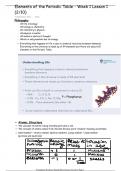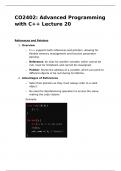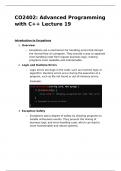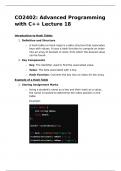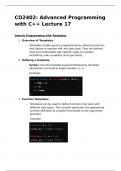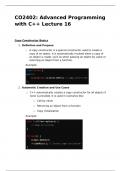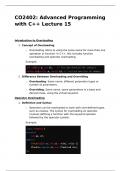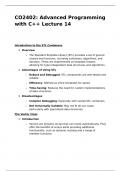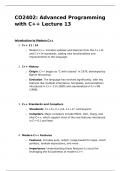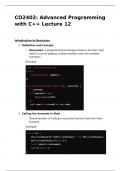University of Central Lancashire Preston (UCLAN)
Latest uploads at University of Central Lancashire Preston (UCLAN). Looking for notes at University of Central Lancashire Preston (UCLAN)? We have lots of notes, study guides and revision notes available for your school.
-
144
-
7
-
19
Courses at University of Central Lancashire Preston (UCLAN)
Notes available for the following courses at University of Central Lancashire Preston (UCLAN)
Latest notes & summaries University of Central Lancashire Preston (UCLAN)
There are all 5 modules of the foundation year Bioveterinary Science course from UCLan.
This document contains detailed notes from Lecture 20 of the CO2402 course on Advanced Programming with C++. The lecture explores the concepts of references and pointers, two fundamental features in C++ that provide flexible memory management and efficient function parameter passing. The notes explain the differences between references and pointers, including their usage, advantages, and limitations.
This document contains comprehensive notes from Lecture 19 of the CO2402 course on Advanced Programming with C++. The lecture focuses on exception handling, a crucial mechanism for managing errors and unexpected conditions in software applications. It provides a detailed overview of exceptions, including their role in separating error-handling code from business logic, thereby enhancing program readability and maintainability.
This document provides comprehensive notes from Lecture 18 of the CO2402 course on Advanced Programming with C++. The lecture delves into hash tables, a fundamental data structure used for efficient data storage and retrieval. Hash tables, also known as hash maps, use a hash function to map keys to specific locations in an array, allowing for quick access to associated values.
This document provides comprehensive notes from Lecture 17 of the CO2402 course on Advanced Programming with C++. The lecture focuses on generic programming using templates, a powerful feature in C++ that allows functions and classes to operate with any data type. The notes explain the syntax and usage of templates, illustrating how they enable code reusability and type safety.
This document contains comprehensive notes from Lecture 16 of the CO2402 course on Advanced Programming with C++. The lecture focuses on the concept of copy constructors, a critical feature in C++ for creating copies of objects. It explains the purpose and scenarios where copy constructors are automatically invoked, such as call by value, returning objects from functions, and copy initialization.
This document contains comprehensive notes from Lecture 15 of the CO2402 course on Advanced Programming with C++. The lecture covers the concepts of function and operator overloading, essential features in C++ that allow multiple functions or operators to have the same name with different parameters. The notes differentiate between overloading and overriding, explaining their unique characteristics and use cases.
This document contains detailed notes from Lecture 14 of the CO2402 course on Advanced Programming with C++. The lecture focuses on the Standard Template Library (STL) in C++, highlighting its importance in providing a set of robust and efficient generic classes and functions. The notes cover various STL containers, with a particular emphasis on the vector class—a dynamic array that offers additional functionality such as automatic resizing and various member functions.
This document provides comprehensive notes from Lecture 13 of the CO2402 course on Advanced Programming with C++. The lecture focuses on the advancements and features introduced in modern C++, specifically from the C++11 and C++14 standards. It covers a range of new functionalities that have significantly improved the language's efficiency, safety, and expressiveness.
This document contains detailed notes from Lecture 12 of the CO2402 course on Advanced Programming with C++. The lecture explores the concept of recursion, a fundamental programming technique where a function calls itself. It provides a comprehensive overview of recursion, including its key characteristics, such as the necessity of a base case to prevent infinite loops.

